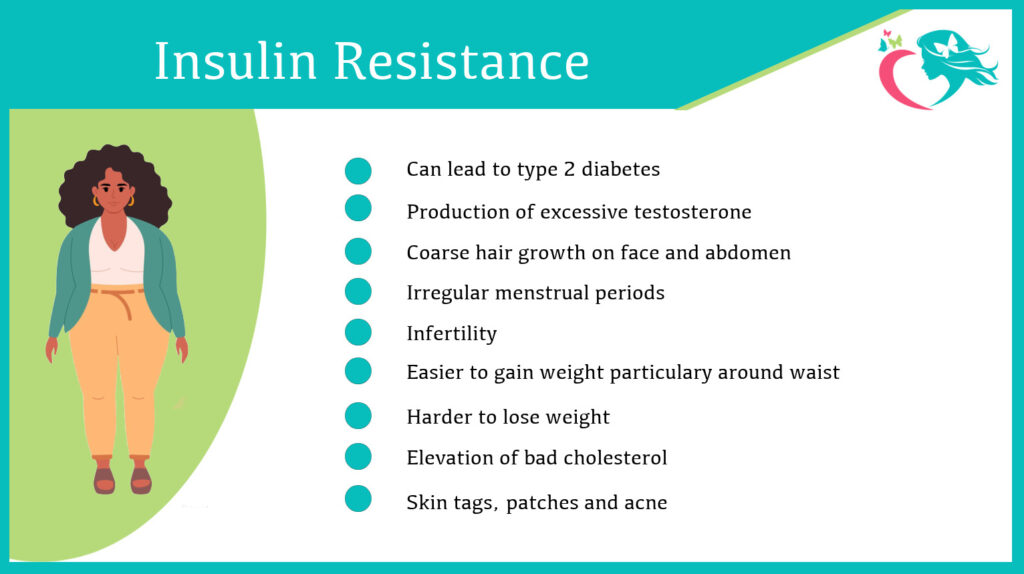Insulin Resistance and Why It Is Important
Insulin resistance is a condition where your blood sugar levels are normal, but your insulin levels are higher than normal to keep your blood sugar levels normal. The cells in your body are not responding normally to insulin’s actions to control blood sugar levels.
How is insulin resistance different from diabetes?
Diabetes is the medical condition when the sugar levels in your blood are higher than normal. Untreated, this can cause severe medical problems, including heart attacks, strokes, and death.
High insulin levels
Insulin resistance is important for many reasons
1. It can lead to overt type 2 diabetes.
2. Insulin is a very active hormone that affects many other processes in the body.
- It can cause the ovaries to produce excessive testosterone.
- Course hair growth on the face and abdomen
- Irregular menstrual periods
- Infertility
- It is much easier to gain weight, particularly around the waist.
- It may make it harder to lose weight.
- It contributes to elevations in the bad cholesterol levels and heart attacks.
- Insulin directly causes skin tags and patches of dark, velvety skin called
acanthosis nigricans to grow.
Other conditions associated with insulin resistance
Insulin resistance is frequently found with “Metabolic Syndrome” or “Syndrome X”. This is a condition that is characterized by stomach obesity, elevated triglyceride levels, low HDL-C levels, elevated blood pressure and elevated fasting blood sugars. These women have a significant increase in heart disease, strokes, and death.
Why does insulin resistance occur?
Nobody knows exactly what causes insulin resistance. Anyone can develop it. We know some of the risk factors associated with insulin resistance. These risk factors include being overweight, being 45 or older and having a sedentary lifestyle.
There is a genetic predisposition to insulin resistance. It is found more frequently in those with a family history of Type 2 Diabetes. It is also found more frequently in those with African American, Alaska Native, American Indian, Asian American, Hispanic/Latino, Native Hawaiian, or Pacific Islander American ethnicity.
Women with other hormonal imbalances, such as polycystic ovarian syndrome or a history of gestational diabetes (high blood sugar during pregnancy) are more likely to have insulin resistance.
How is insulin resistance tested?
The presence of insulin resistance is determined by performing a three-hour glucose tolerance test and having blood sugars and insulin levels performed on each blood specimen. Elevations in the insulin levels without associated blood sugar elevations confirms the presence of insulin resistance.
Why is diagnosing insulin resistance important to me?
Diagnosing insulin resistance is important because it is a precursor disease leading to much more severe medical issues. Type 2 diabetes, heart disease and heart attacks, strokes, and death are much more frequent in those who with untreated insulin resistance.
Can insulin resistance be treated?
Yes! Insulin resistance can be treated with medication.
Normal insulin levels, diet and an active lifestyle can lead to meaningful weight loss. With adequate weight loss, the insulin resistance resolves in up to half of women.
When insulin resistance does not resolve, the long-term maintenance of the insulin levels in the normal range can still result in many benefits.
The end-organ effects of elevated insulin activity in the body can resolve. Blood testosterone levels return to normal, acne, excess hair growth and acanthosis nigricans resolve. Ovulations improve, menstrual cycles become regular and women become pregnant. And for some women, the progression to type 2 diabetes is delayed or avoided.
Who treats insulin resistance?
A Reproductive Endocrinologist/Gynecologist, like Dr. Burke, who has decades of experience diagnosing and treating insulin resistance in women, is an ideal physician to treat this condition.
If you are a woman who has been diagnosed with PCOS (polycystic ovarian syndrome), insulin resistance or suffer from acne, excessive hair growth, irregular periods, infertility, have a personal history of diabetes during one of your pregnancies or a family history of type 2 (adult onset) diabetes, call Dr. Burke today and let him evaluate you for insulin resistance.
Your future health and happiness may depend on it.
Appointments
Call to schedule an appointment.
856-429-2212
Additional articles you might find interesting…



